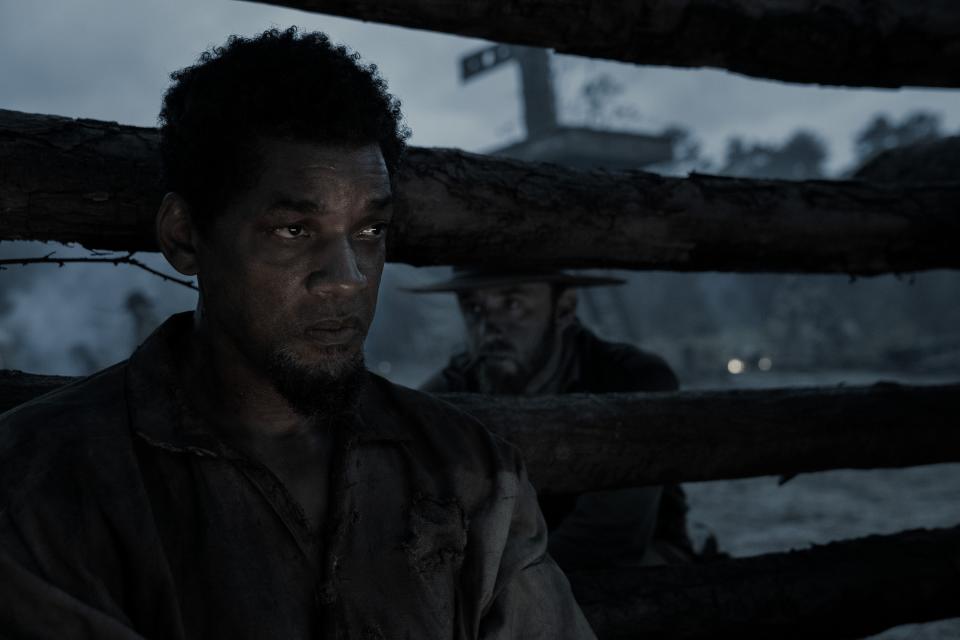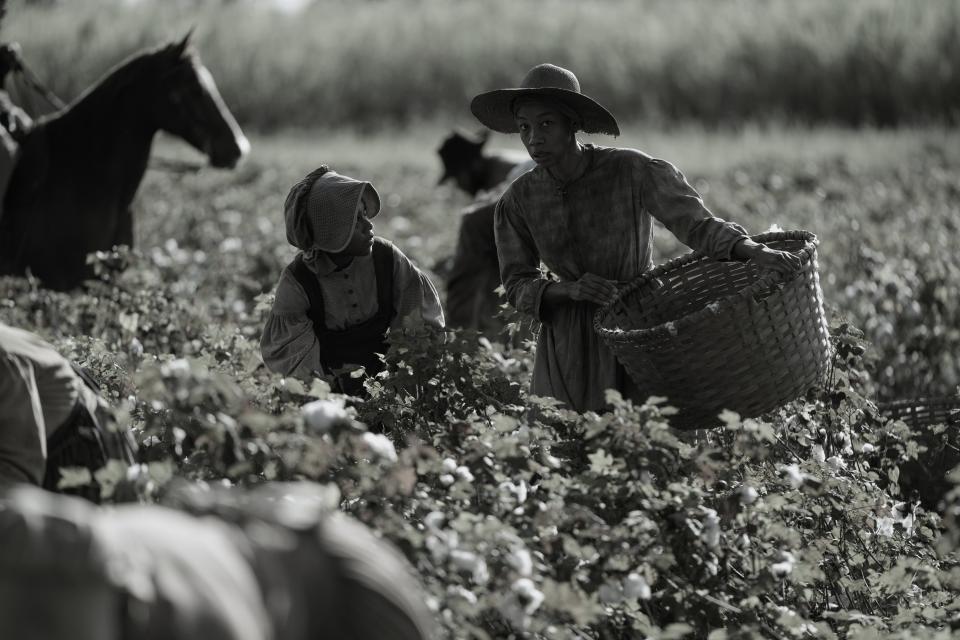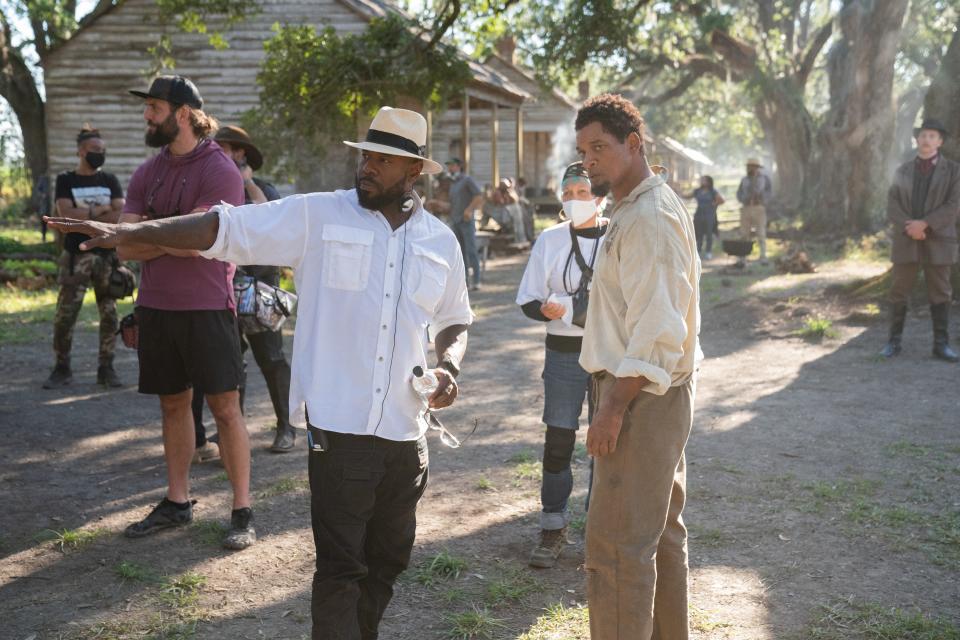'Emancipation': How far is too far when putting Black audiences through trauma? Experts weigh in
- Oops!Something went wrong.Please try again later.
- Oops!Something went wrong.Please try again later.
With slave heads mounted on sticks, bodies hanging from trees and death from labor exhaustion, Will Smith's "Emancipation" accurately depicts the violence used to maintain racial hierarchy in plantation-era America.
The Antoine Fuqua-directed movie (now streaming on Apple TV+) is about a historic 1863 photo, known as "The Scourged Back" or "Whipped Peter," of a real-life enslaved man named Gordon. His lacerated back galvanized Northerners to denounce slavery that continued in the South even after President Abraham Lincoln signed the Emancipation Proclamation. Given the nature of the image, it's no surprise that the film is graphic.
"Emancipation" focuses on the moment Peter (Smith) overhears that slavery has been abolished. He and fellow runaway slaves Gordon (Gilbert Owuor) and John (Michael Luwoye) navigate the treacherous swamps of Louisiana to find the Union army after escaping plantation master Jim Fassel (Ben Foster).
"There’s a propulsive quality to the film, especially with Peter on the run," writes USA TODAY's Brian Truitt in his review. "Yet it’s not an easy watch, with images of decapitated heads, sounds of whips and screams, and other horrific traumas suffered by enslaved people of the time."
More: 'Emancipation' review: A powerhouse Will Smith lifts the wobbly Apple TV+ action thriller
Eyerolls about "another slavery movie" made the rounds on Twitter, and even Smith said his daughter Willow was skeptical. "My daughter asked me, she's like, 'Daddy, do we really need another slave movie?'" he recalled on "The Daily Show" in November. "I said, 'Baby, I promised you I wouldn't make a slave movie. This is a freedom movie.'"
Experts say "fatigue" of trauma shouldn't outweigh the necessity for telling stories about slavery. This is true, especially during a time when education on race is up for debate. But how consumers receive the message will be affected by the intensity of violence: How far is too far?

Will Smith knows people may skip 'Emancipation' after Oscars slap:'I completely understand'
"I am of the opinion that these films are just necessary, much like movies that touch on the Holocaust experience that one should never forget," says Gil Robertson, co-founder of the African American Film Critics Association. "It's important for us to remember our past so that we don't repeat it. "We need to understand the full extremity of what slavery was and still is," he says, as the only way to "gain the momentum and support behind making sure that the tradition of slavery is ever stamped out of existence."
Reviews and reactions on "Black Twitter" have been mixed, as people scrutinize whether "Emancipation" is educational or trauma porn, stemming from violent racist imagery.
Danielle Deadwyler, who portrayed Mamie Till-Mobley in Chinonye Chukwu's "Till," received similar criticism for starring in that 2022 movie because it centered on another historical instance of violence against Black people. The lynching of Emmett isn't depicted in the movie, although his cries are heard and his brutalized body – infamously captured in a Jet magazine photo – is shown.
To critics, Deadwyler asked in an interview: "Do you want to turn a blind eye to history in the way that certain people and systems and institutions want to turn a blind eye to our imprint on this country?"
There's an oversaturation of recent entertainment projects based on racial injustice, Robertson adds, suggesting that filmmakers should be conscious about the release dates of heavier movies. "Let's pair the 'Emancipation' movie and an Emmett Till movie with something fun and fanciful like 'The Best Man,'" he says, proposing more films about Black joy to add as a counterbalance.
"Ideally, the movies are supposed to be a break away from reality," he says. "This constant confrontation of these very real-life challenges that come from being a Black can cause you to just want to bail out."

All the TV show premiere dates you need to know: From '1923' to 'Emily in Paris' and more
The reality is that even if viewers are interested in the preservation of history through entertainment, it is distressing. "Exposure to discrimination and discrimination (experienced) directly can lead to more symptoms like depression and anxiety," says Tanisha Thelemaque, a psychologist and equity inclusion consultant who has worked with Warner Bros.
"Looking at a lot of violence, something that's pretty graphic and something that's also bringing up these events of discrimination can have a lingering and lasting effect," she says.
Studies have shown it's also harder for people to look away when they see something violent, Thelemaque says. "You're going to feel more worried or on edge" with films about collective trauma in a way you wouldn't with a horror movie, where you're expecting a high level of gore and are given more time to emotionally prepare, Thelemaque says. "You're going to experience that vicarious trauma because it's also relating to a real-world event."
Viewers should be able to absorb the impact the image of "The Scourged Back" had at the time despite the distressing imagery, Robertson says, adding he thought the film was "done very well. ... I was curious to find out more about (Gordon) because I'd only been presented with the image and of course when you see it it causes you to think, 'What must his life have been like?' And to actually get a sense of that from the movie was edifying for me," he says.
Letitia Wright criticizes article comparing anti-vaccine uproar to Will Smith, Brad Pitt controversies
Reviews are mixed on if the brutality overshadowed the messaging.
NAACP President and CEO Derrick Johnson tweeted that he "can’t begin to tell how powerful this is for OUR community and OUR history. It’s a story of adversity, of resilience, of love, and of triumph."
Variety's Peter Debruge called it an "essential slave saga," writing that Fuqua's visuals hammer home the message: "Whatever you’ve heard about slavery can’t compare to witnessing it. For many, until they’ve seen the brutality for themselves, slavery remains an abstract concept – something taught in schools but not fully processed."

Will Smith and Chris Rock: Everything to know about the infamous Oscars 2022 slap
In contrast, The Hollywood Reporter's Lovia Gyarkye says such films are "touted as history lessons and used as bargaining chips for empathy," but "Emancipation" still "leaves one wondering about who Peter was as a person."
Deadline's Valerie Complex reflected on whether "seeing so much Black death onscreen" was more "exhausting and painful" because "Emancipation" was written by Bill Collage, who is white.
"It adds another layer of nuance to an already complicated conversation that digs up further questions about how these stories are told, and who is telling them. Would it have been a different experience if Collage were Black? Hard to say," Complex writes.
A similar critique has extended to producer Joey McFarland, who was recently criticized for bringing the original photo of "The Scourged Back" to the "Emancipation" premiere. (He also revealed he has a collection of similar artifacts.) McFarland has since apologized and vowed to "find the right permanent home and make sure they are accessible, to honor their significance."
Franklin Leonard, founder of screenplay reviewer and studio liaison organization The Black List, was among the first to condemn McFarland.
"One reasonable person's honest storytelling about trauma can be another reasonable person's deeply traumatic experience viewing it. That's the nature of art, fundamentally. It's also why the real danger isn't an individual film," Leonard says. "It's a system that permits a limited number of people with similar perspectives and backgrounds to be solely responsible for determining the overwhelming majority of what gets made, by whom, and with what resources, even if they aren't culturally savvy or educated enough to make good decisions when they have the opportunity."

New movies this week: Watch Will Smith's 'Emancipation,' stream Robert Downey Jr.'s 'Sr.'
Ultimately, Black audiences should have the tools to emotionally cope with a film like "Emancipation," Thelemaque says. It's OK to walk out of the theater or press pause if watching at home.
"To slow down your heart rate be intentional, focusing on your body and being connected" with methods such as taking deep breaths or scanning your body to release muscles feeling the most tension, she recommends.
After the film, Thelemaque recommends talking about it with someone. "But also let's not continue to look at anything else that's graphic for the rest of the evening," she adds. Other options to destress include walking, taking a social media break, doing breath work, drinking water and listening to calming music.
Aftercare "can go a long way in terms of it not becoming a larger issue," she says.
Whether filmmakers should draw a line when it comes to putting Black audiences through trauma is up for personal debate. But an emotional safety net is the best tool viewers can have as Hollywood continues to push the boundaries on violence.
This article originally appeared on USA TODAY: 'Emancipation': Should there be a limit on violence in slavery movies?

